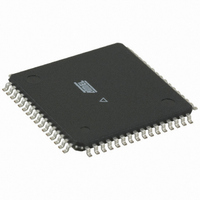ATMEGA128L-8AU Atmel, ATMEGA128L-8AU Datasheet - Page 36

ATMEGA128L-8AU
Manufacturer Part Number
ATMEGA128L-8AU
Description
IC AVR MCU 128K 8MHZ 3V 64TQFP
Manufacturer
Atmel
Series
AVR® ATmegar
Datasheets
1.ATMEGA128-16AU.pdf
(26 pages)
2.ATMEGA128-16AU.pdf
(385 pages)
3.ATMEGA128-16AU.pdf
(389 pages)
Specifications of ATMEGA128L-8AU
Core Processor
AVR
Core Size
8-Bit
Speed
8MHz
Connectivity
EBI/EMI, I²C, SPI, UART/USART
Peripherals
Brown-out Detect/Reset, POR, PWM, WDT
Number Of I /o
53
Program Memory Size
128KB (64K x 16)
Program Memory Type
FLASH
Eeprom Size
4K x 8
Ram Size
4K x 8
Voltage - Supply (vcc/vdd)
2.7 V ~ 5.5 V
Data Converters
A/D 8x10b
Oscillator Type
Internal
Operating Temperature
-40°C ~ 85°C
Package / Case
64-TQFP, 64-VQFP
Cpu Family
ATmega
Device Core
AVR
Device Core Size
8b
Frequency (max)
8MHz
Interface Type
2-Wire/JTAG/USART
Total Internal Ram Size
4KB
# I/os (max)
53
Number Of Timers - General Purpose
4
Operating Supply Voltage (typ)
3.3/5V
Operating Supply Voltage (max)
5.5V
Operating Supply Voltage (min)
2.7V
On-chip Adc
8-chx10-bit
Instruction Set Architecture
RISC
Operating Temp Range
-40C to 85C
Operating Temperature Classification
Industrial
Mounting
Surface Mount
Pin Count
64
Package Type
TQFP
Processor Series
ATMEGA128x
Core
AVR8
Data Bus Width
8 bit
Data Ram Size
4 KB
Maximum Clock Frequency
8 MHz
Number Of Programmable I/os
53
Number Of Timers
4
Operating Supply Voltage
2.7 V to 5.5 V
Maximum Operating Temperature
+ 85 C
Mounting Style
SMD/SMT
3rd Party Development Tools
EWAVR, EWAVR-BL
Minimum Operating Temperature
- 40 C
A/d Inputs
8-Channel, 10-Bit
Cpu Speed
8 MIPS
Eeprom Memory
4K Bytes
Input Output
53
Interface
2-Wire/JTAG/SPI/USART
Memory Type
Flash
Number Of Bits
8
Programmable Memory
128K Bytes
Timers
2-8-bit, 2-16-bit
Voltage, Range
4.5-5.5 V
Controller Family/series
AVR MEGA
No. Of I/o's
53
Eeprom Memory Size
4096Byte
Ram Memory Size
4KB
Rohs Compliant
Yes
For Use With
ATSTK600-TQFP64 - STK600 SOCKET/ADAPTER 64-TQFP770-1007 - ISP 4PORT ATMEL AVR MCU SPI/JTAG770-1005 - ISP 4PORT FOR ATMEL AVR MCU JTAG770-1004 - ISP 4PORT FOR ATMEL AVR MCU SPIATAVRISP2 - PROGRAMMER AVR IN SYSTEMATJTAGICE2 - AVR ON-CHIP D-BUG SYSTEMATSTK501 - ADAPTER KIT FOR 64PIN AVR MCUATSTK500 - PROGRAMMER AVR STARTER KIT
Lead Free Status / RoHS Status
Lead free / RoHS Compliant
Available stocks
Company
Part Number
Manufacturer
Quantity
Price
Company:
Part Number:
ATMEGA128L-8AU
Manufacturer:
MURATA
Quantity:
120 000
Company:
Part Number:
ATMEGA128L-8AU
Manufacturer:
ATM
Quantity:
450
Part Number:
ATMEGA128L-8AU
Manufacturer:
ATMEL/爱特梅尔
Quantity:
20 000
Crystal Oscillator
36
ATmega128
XTAL1 and XTAL2 are input and output, respectively, of an inverting amplifier which can
be configured for use as an On-chip Oscillator, as shown in Figure 19. Either a quartz
crystal or a ceramic resonator may be used. The CKOPT fuse selects between two dif-
ferent Oscillator Amplifier modes. When CKOPT is programmed, the Oscillator output
will oscillate will a full rail-to-rail swing on the output. This mode is suitable when operat-
ing in a very noisy environment or when the output from XTAL2 drives a second clock
buffer. This mode has a wide frequency range. When CKOPT is unprogrammed, the
Oscillator has a smaller output swing. This reduces power consumption considerably.
This mode has a limited frequency range and it can not be used to drive other clock
buffers.
For resonators, the maximum frequency is 8 MHz with CKOPT unprogrammed and 16
MHz with CKOPT programmed. C1 and C2 should always be equal for both crystals and
resonators. The optimal value of the capacitors depends on the crystal or resonator in
use, the amount of stray capacitance, and the electromagnetic noise of the environ-
ment. Some initial guidelines for choosing capacitors for use with crystals are given in
Table 8. For ceramic resonators, the capacitor values given by the manufacturer should
be used.
Figure 19. Crystal Oscillator Connections
The Oscillator can operate in three different modes, each optimized for a specific fre-
quency range. The operating mode is selected by the fuses CKSEL3..1 as shown in
Table 8.
Table 8. Crystal Oscillator Operating Modes
Note:
The CKSEL0 fuse together with the SUT1..0 fuses select the start-up times as shown in
Table 9.
CKOPT
1
1
1
0
1. This option should not be used with crystals, only with ceramic resonators.
101, 110, 111
CKSEL3..1
101
110
111
(1)
Frequency Range
0.4 - 0.9
0.9 - 3.0
3.0 - 8.0
C2
C1
(MHz)
1.0 -
Recommended Range for Capacitors
C1 and C2 for Use with Crystals
XTAL2
XTAL1
GND
12 pF - 22 pF
12 pF - 22 pF
12 pF - 22 pF
–
2467M–AVR–11/04















